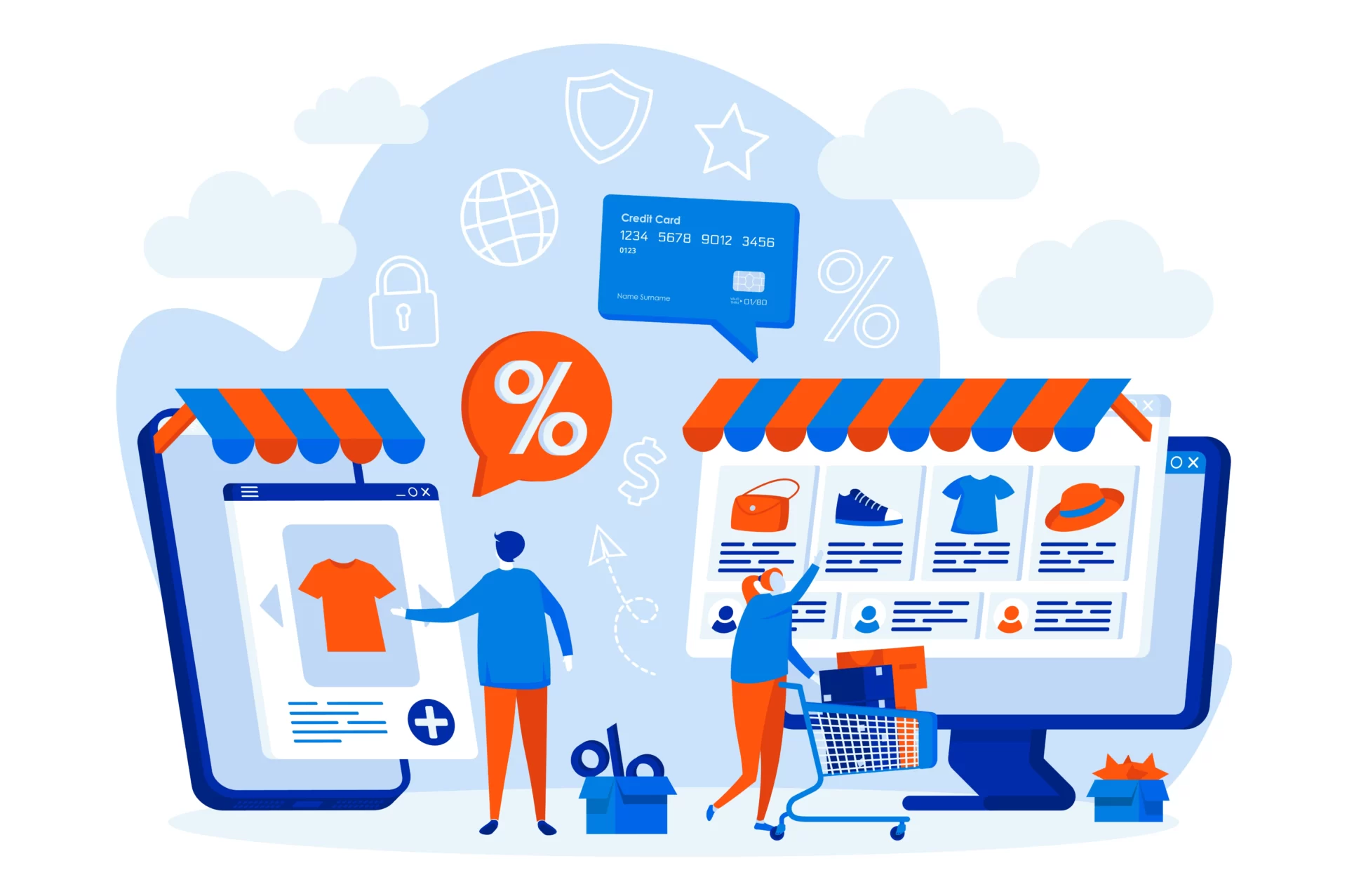In today’s digital age, the success of businesses hinges on their online presence, and e-commerce platform solutions are at the forefront of this revolution. This comprehensive guide to e-commerce application development will explore the various aspects of creating a successful e-commerce application, including selecting the right solution, designing a user-friendly application, ensuring security and reliability, and more. Let’s dive in.
1. Choosing the Right E-commerce Platform
Before embarking on the e-commerce application development journey, it is crucial to choose a platform that aligns with your business goals and objectives. The right e-commerce platform can significantly impact the user experience and overall success of your online store.
a. Comparing popular e-commerce platforms
There are numerous e-commerce platforms available on the market, each with its unique features and capabilities. Some popular options include Shopify, WooCommerce, Magento, and BigCommerce. Comparing these platforms in terms of pricing, scalability, ease of use, and customization options can help you make an informed decision.
b. Essential features to consider in an e-commerce platform
When selecting an e-commerce platform, consider features such as payment gateway integration, inventory management, order tracking, and shipping options. Additionally, look for platforms that offer SEO optimization, mobile responsiveness, and various marketing tools to help your online store grow.
c. Customizable platforms vs. pre-built solutions
While pre-built e-commerce solutions offer simplicity and ease of use, customizable platforms provide greater flexibility and control over your online store’s design and functionality. Consider the level of customization you require when choosing an e-commerce platform.
2. Designing a User-Friendly E-commerce Application
User experience (UX) plays a pivotal role in the success of your e-commerce application. An intuitive, easy-to-navigate online store can boost customer engagement and encourage repeat business.
a. Importance of user experience (UX) in e-commerce platform success
Positive UX leads to higher customer satisfaction, increased brand loyalty, and improved conversion rates. Ensuring a seamless shopping experience on your e-commerce platform is essential for attracting and retaining customers.
b. Elements of an effective e-commerce application design
An effective e-commerce application design should include a clean and organized layout, easy-to-find product categories, and clear calls to action. Moreover, ensure that your online store offers multiple payment options, a simple checkout process, and intuitive navigation to enhance the user experience.
c. Responsive web design for a seamless shopping experience
With the growing use of mobile devices for online shopping, a responsive web design that adapts to different screen sizes and resolutions is essential. This ensures a consistent and seamless shopping experience across various devices, including smartphones, tablets, and desktops.
3. Secure and Reliable E-commerce Platform Development
Security and reliability are paramount in e-commerce application development. Ensuring the protection of sensitive customer data and maintaining a stable, high-performing platform can boost customer trust and loyalty.
a. The significance of security in e-commerce applications
Security breaches can result in financial losses, tarnish your brand reputation, and erode customer trust. Implementing robust security measures, such as secure sockets layer (SSL) encryption, two-factor authentication, and regular security audits, can help protect your e-commerce platform and customer data from cyber threats.
b. Implementing secure payment gateways
Integrating secure payment gateways, such as Stripe and PayPal, ensures the safe processing of customer transactions. Choose payment gateways that offer fraud detection, data encryption, and compliance with the Payment Card Industry Data Security Standard (PCI DSS) to safeguard your customers’ financial information.
c. Ensuring platform reliability and performance
A high-performing and reliable e-commerce platform helps retain customers and minimize cart abandonment. Optimize your online store’s performance by implementing caching, reducing server response times, and compressing images. Additionally, choose a reliable web hosting provider that offers excellent uptime, fast loading speeds, and ample bandwidth to handle peak traffic.
4. E-commerce Platform Integrations
Seamless integration of various e-commerce features and third-party services can significantly enhance your online store’s functionality and customer experience.
a. Incorporating essential e-commerce features and tools
Integrate essential e-commerce features, such as product search, filters, reviews, and wishlists, to provide a comprehensive shopping experience. Additionally, consider incorporating marketing tools, such as email marketing, social media integration, and remarketing, to boost your store’s visibility and reach.
b. Integrating third-party services for a seamless customer journey
Third-party integrations, such as customer relationship management (CRM) systems, inventory management software, and shipping providers, can help streamline your e-commerce operations and enhance the customer journey. Choose third-party services that offer seamless integration with your e-commerce platform for optimal functionality.
c. Leveraging analytics tools for data-driven insights
Integrating analytics tools, like Google Analytics, can provide valuable insights into customer behavior, sales trends, and website performance. Use these data-driven insights to inform your marketing strategies, improve your online store’s user experience, and drive revenue growth.
5. E-commerce Application Development Best Practices
Adhering to industry best practices and guidelines can help ensure a successful e-commerce application development process and ongoing platform maintenance.
a. Adhering to industry standards and guidelines
Follow industry standards, such as the Web Content Accessibility Guidelines (WCAG), to ensure your e-commerce platform is accessible to a diverse range of users. Additionally, stay updated on the latest web development trends and technologies to maintain a cutting-edge online store.
b. Ongoing platform maintenance and updates
Regularly update your e-commerce platform to fix bugs, improve performance, and add new features. Schedule routine maintenance to minimize downtime and ensure your online store remains fully functional and up-to-date.
c. Ensuring scalability and flexibility for future growth
Choose an e-commerce platform that offers scalability and flexibility to accommodate your business’s future growth. As your online store expands, you may need additional features, integrations, and customizations to meet evolving customer demands and stay competitive in the market.
6. Conclusion
The impact of e-commerce application development on business success cannot be overstated. By carefully selecting the right e-commerce platform, designing a user-friendly application, ensuring security and reliability, and following industry best practices, you can maximize your online store’s potential and stay ahead in the competitive e-commerce landscape. Embrace innovation, invest in ongoing platform maintenance and updates, and leverage data-driven insights to create a thriving e-commerce platform that meets the evolving needs of your customers and drives business growth.

Frequently Asked Questions
1. What is the importance of e-commerce application development?
E-commerce application development is crucial for creating an online store that attracts and retains customers, provides a seamless user experience, and generates revenue. A well-designed and functional e-commerce platform can help businesses expand their reach, improve customer satisfaction, and stay competitive in the digital marketplace.
2. How can I choose the right e-commerce platform for my business?
When choosing an e-commerce platform, consider factors such as pricing, scalability, ease of use, customization options, and essential features like payment gateways, inventory management, and marketing tools. Compare popular e-commerce platforms, such as Shopify, WooCommerce, Magento, and BigCommerce, to find the best fit for your business goals and objectives.
3. What are some essential features to include in my e-commerce application?
Essential e-commerce application features include a clean and organized layout, easy-to-find product categories, clear calls to action, multiple payment options, a simple checkout process, and intuitive navigation. Additionally, consider integrating marketing tools, analytics, and third-party services to enhance your online store’s functionality and customer experience.
4. How can I ensure the security and reliability of my e-commerce platform?
Implement robust security measures, such as SSL encryption, two-factor authentication, and regular security audits to protect your e-commerce platform and customer data. Choose secure payment gateways that offer fraud detection and PCI DSS compliance. Optimize your online store’s performance with caching, reduced server response times, and image compression, and choose a reliable web hosting provider for optimal uptime and loading speeds.
5. How can I maintain and update my e-commerce platform?
Schedule regular updates to fix bugs, improve performance, and add new features to your e-commerce platform. Conduct routine maintenance to minimize downtime and keep your online store fully functional and up-to-date. Stay informed about industry standards, web development trends, and new technologies to maintain a cutting-edge e-commerce platform.
6. What are some best practices for e-commerce application development?
Adhere to industry standards, such as WCAG, to ensure accessibility for a diverse range of users. Invest in ongoing platform maintenance and updates, and choose an e-commerce platform that offers scalability and flexibility for future growth. Leverage analytics tools and data-driven insights to improve your online store’s user experience, marketing strategies, and revenue growth.

